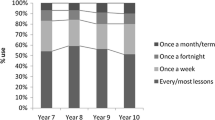Abstract
Science educators unanimously agree that textbooks play an important role in teaching and learning process (Clement, 2008; Koppal & Caldwell, 2004). For this reason, numerous research studies have been conducted in science textbook analysis in the past several decades. In 1941, Graham noted that “The textbook is an old instrument in learning and teaching processes” and traced the origin of the textbook that can be dated back to the Greek classical era. With the invention of the printing press, textbooks became omnipresent in every school. Since the textbooks are being used as a major source of information in teaching a particular subject, the quality and accuracy of the content is crucial for their educational effectiveness.
Access this chapter
Tax calculation will be finalised at checkout
Purchases are for personal use only
Similar content being viewed by others
References
Bezemer, J., & Kress, G. (2010). Changing text: A social semiotic analysis of textbooks. Deigns for Learning, 3, 10–29.
Bianchini, J. A., & Kelly, G. J. (2002). Challenges of standards-based reform: The example of California’s science content standards and textbook adoption process. Science Education, 87(3), 378–389.
Bulger, M., Murphy, J., Scheible, J., & Lagresa, E. (2011). Interdisciplinary knowledge work: Digital textual analysis tools and their collaborative affordance. In L. McGrath (Ed.), Collaborative approaches to the digital in English Studies (pp. 252–278). Logan, UT: Computers and Composition Digital Press/Utah State University Press. Retrieved 17 May 2012 from http://ccdigitalpress.org/ebooks-and-projects/cad.
Clement, P. (2008). Critical analysis of school science textbooks. Science Education International, 19, 93–96.
Graham, C. (1941). Some data pertinent to textbooks of general science. Science Education, 25, 35–41.
Issitt, J. (2004). Reflections on the study of textbooks. History of Education, 33, 683–696.
Izquierdo, M., & Gouvea, G. (2008). A proposal for textbook analysis: Rhetorical structure. Science Education International, 19, 2090218.
Koppal, M., & Caldwell, A. (2004). Meeting the challenge of science literacy: Project 2061 efforts to improve science education. Cell Biology Education, 3, 28–30.
Ninnes, P. (2000). Representations of indigenous knowledges in secondary school science textbooks in Australia and Canada. International Journal of Science Education, 22, 603–617.
**el, F. (2010). UNESCO Guidebook on Textbook Research and Textbook Revision. Paris: United Nations Educational, Scientific and Cultural Organization.
Rockwell, G. (2012). What is text analysis?. Retrieved May 17, 2012 from http://tada.mcmaster.ca/Main/WhatTA
Roseman, J., Stern, L., & Koppan, M. (2010). A method for analyzing the coherence of high school biology textbooks. Journal of Research in Science Teaching, 47, 47–70.
Woody, W. D., Daniel, D. B., & Baker, C. A. (2010). E-books or textbooks: Students prefer textbooks. Computers in Education, 55, 945–948.
Author information
Authors and Affiliations
Corresponding author
Editor information
Editors and Affiliations
Rights and permissions
Copyright information
© 2013 Springer Science+Business Media B.V.
About this chapter
Cite this chapter
Khine, M.S. (2013). Analysis of Science Textbooks for Instructional Effectiveness. In: Khine, M. (eds) Critical Analysis of Science Textbooks. Springer, Dordrecht. https://doi.org/10.1007/978-94-007-4168-3_15
Download citation
DOI: https://doi.org/10.1007/978-94-007-4168-3_15
Published:
Publisher Name: Springer, Dordrecht
Print ISBN: 978-94-007-4167-6
Online ISBN: 978-94-007-4168-3
eBook Packages: Humanities, Social Sciences and LawEducation (R0)



